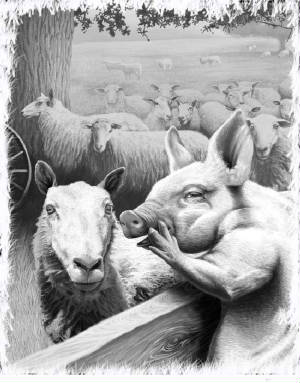 George Orwell, Animal Farm:
George Orwell, Animal Farm:Suddenly, early in the spring, an alarming thing was discovered. Snowball was secretly frequenting the farm by night! The animals were so disturbed that they could hardly sleep in their stalls. Every night, it was said, he came creeping in under cover of darkness and performed all kinds of mischief. He stole the corn, he upset the milk-pails, he broke the eggs, he trampled the seedbeds, he gnawed the bark off the fruit trees. Whenever anything went wrong it became usual to attribute it to Snowball.
If a window was broken or a drain was blocked up, someone was certain to say that Snowball had come in the night and done it, and when the key of the store-shed was lost, the whole farm was convinced that Snowball had thrown it down the well. Curiously enough, they went on believing this even after the mislaid key was found under a sack of meal.
* * *
Napoleon decreed that there should be a full investigation into Snowball's activities. With his dogs in attendance he set out and made a careful tour of inspection of the farm buildings, the other animals following at a respectful distance. At every few steps Napoleon stopped and snuffed the ground for traces of Snowball's footsteps, which, he said, he could detect by the smell. He snuffed in every corner, in the barn, in the cow-shed, in the henhouses, in the vegetable garden, and found traces of Snowball almost everywhere. He would put his snout to the ground, give several deep sniffs, and exclaim in a terrible voice, "Snowball! He has been here! I can smell him distinctly!" and at the word "Snowball" all the dogs let out blood-curdling growls and showed their side teeth.
The animals were thoroughly frightened. It seemed to them as though Snowball were some kind of invisible influence, pervading the air about them and menacing them with all kinds of dangers.
If a window was broken or a drain was blocked up, someone was certain to say that Snowball had come in the night and done it, and when the key of the store-shed was lost, the whole farm was convinced that Snowball had thrown it down the well. Curiously enough, they went on believing this even after the mislaid key was found under a sack of meal.
* * *
Napoleon decreed that there should be a full investigation into Snowball's activities. With his dogs in attendance he set out and made a careful tour of inspection of the farm buildings, the other animals following at a respectful distance. At every few steps Napoleon stopped and snuffed the ground for traces of Snowball's footsteps, which, he said, he could detect by the smell. He snuffed in every corner, in the barn, in the cow-shed, in the henhouses, in the vegetable garden, and found traces of Snowball almost everywhere. He would put his snout to the ground, give several deep sniffs, and exclaim in a terrible voice, "Snowball! He has been here! I can smell him distinctly!" and at the word "Snowball" all the dogs let out blood-curdling growls and showed their side teeth.
The animals were thoroughly frightened. It seemed to them as though Snowball were some kind of invisible influence, pervading the air about them and menacing them with all kinds of dangers.
Los Angeles Times, June 3, 2006:
U.S. defense officials pushed back Friday against the latest reports claiming military wrongdoing in Iraq, denying accounts that American soldiers had deliberately killed a dozen civilians in a March raid while acknowledging that more noncombatants died than the military first reported.
* * *
The U.S. military initially reported that four people, a suspected insurgent and three civilians, were killed in the March 15 raid. But Friday, officials acknowledged that nine other noncombatants had been killed, calling the additional casualties "collateral deaths."
It is unclear when the other civilian deaths were discovered, and a military spokesman in Baghdad said that the "timetable of the investigation is not up for discussion."
* * *
A senior Pentagon official said Friday that the military's investigation, which began soon after the Ishaqi incident, found that the civilians were killed in crossfire between American forces and members of Abu Musab Zarqawi's Al Qaeda in Iraq organization.
* * *
The U.S. military initially reported that four people, a suspected insurgent and three civilians, were killed in the March 15 raid. But Friday, officials acknowledged that nine other noncombatants had been killed, calling the additional casualties "collateral deaths."
It is unclear when the other civilian deaths were discovered, and a military spokesman in Baghdad said that the "timetable of the investigation is not up for discussion."
* * *
A senior Pentagon official said Friday that the military's investigation, which began soon after the Ishaqi incident, found that the civilians were killed in crossfire between American forces and members of Abu Musab Zarqawi's Al Qaeda in Iraq organization.







No comments:
Post a Comment